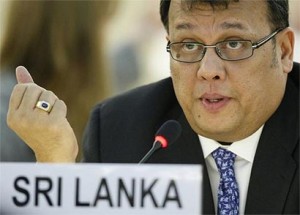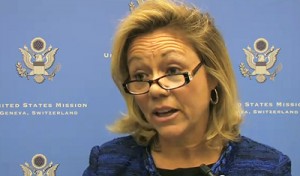why is Sri Lanka opposing US-sponsored resolution to implement its own LLRC recommendations?
“Unlike the last occasion, however, this time around the sponsor of the resolution is no less than the United States, which is the world’s dominant political and economic power. This time the resolution that is proposed will also be harder to overcome. The indications are that the resolution will call on the Sri Lankan government to “implement the constructive recommendations” of its own Lessons Learnt and Reconciliation Commission. The resolution is also expected to call attention to the shortcomings in the LLRC’s findings on accountability issues that arose in the field of military battle, especially in its last phase, with accusations of sending inadequate supplies of food and medicine to the civilian population and battlefield executions, among many other allegations”
Sri Lanka’s conduct of its final war against the LTTE is an issue taking centre stage at the 19th session of the Human Rights Council in Geneva that commenced on Monday and will continue most of the following month. All
indications are that the United States and its western allies in particular will be presenting a resolution on Sri Lanka. This is likely to be put to the vote due to the Sri Lankan opposition to it. The Sri Lankan government has taken on its detractors in an intense lobbying campaign and war of words that gives a sense of the proud nationalism that drives it and which can also win the support of like-minded developing countries. In May 2009 when a similar resolution on Sri Lanka was sought to be placed before the UN body, it was soundly defeated.
Thwarting a resolution
At the 11th session of the UN Human Rights Council in Geneva in 2009, the Sri Lankan government was able to thwart a resolution against it on war crimes by putting forward its own resolution for which it obtained a majority of votes. The Sri Lankan resolution called for “the principle of non interference in matters that are essentially within the domestic jurisdiction of states.” The countries that voted in favour of the Sri Lankan resolution did so, at least in part, to protect themselves against the controversial UN initiative known as the “Right to Protect” (R2P) that claims that sovereignty is not a privilege but a responsibility, and thereby giving the UN or the dominant section of the international community the opportunity to intervene in international trouble spots.
This time it’s different
Unlike the last occasion, however, this time around the sponsor of the resolution is no less than the United States, which is the world’s dominant political and economic power. This time the resolution that is proposed will also be harder to overcome. The indications are that the resolution will call on the Sri Lankan government to “implement the constructive recommendations” of its own Lessons Learnt and Reconciliation Commission. The resolution is also expected to call attention to the shortcomings in the LLRC’s findings on accountability issues that arose in the field of military battle, especially in its last phase, with accusations of sending inadequate supplies of food and medicine to the civilian population and battlefield executions, among many other allegations.
Door open
The Government of Sri Lanka appointed the LLRC in May 2010 to look back at the conflict that engulfed the country for nearly three decades, but not specifically into the issue of war crimes which is the one that provides the international community with leverage. The government also repeatedly affirmed that the LLRC report would provide an adequate response to allegations leveled against it by international human rights organizations and the
UN panel appointed by the UN Secretary General. The LLRC report analyses the causes of the ethnic conflict and problems of governance in the country. Whilst the LLRC is clear in its call for a political solution, it provides no mechanism to deal with the sharp ethnic divide especially with regard to the violence perpetrated during the course of the war. This has been viewed as the principal weakness of the LLRC report. Several foreign governments have endorsed the recommendations of the LLRC on good governance and a political solution, but expressed disappointment on its findings regarding accountability for war crimes.
The question to answer
A closer reading of the findings on accountability by the LLRC would suggest that it has kept the door open to further findings of the issue of accountability. It has called for investigations into incidents where civilian killings did take place, while also recommending further investigations and for the appointment of a special commissioner with adequate power to investigate and refer cases to the government for action. At the country’s Independence Day celebrations on February 4, President Mahinda Rajapaksa addressed the nation and the international community and stated in unequivocal terms that his government was committed to implementing the LLRC’s recommendations. The question to answer is why the Sri Lankan government is opposing the US-sponsored resolution that will call on it to implement these same recommendations.
Post war reform only further centralised power
Although appointed by the government, the LLRC struck an independent path in terms of its analysis of the roots causes of the violence and war in Sri Lanka and in its proposals for institutional and political reform. Indeed, the LLRC’s recommendations in the areas of accountability, peace building, good governance and reconciliation do not correspond to the government’s practices which, in many respects, are its opposite. Thus, the only major post-war constitutional reform engaged in by the government has been the passage of the 18th Amendment. But this further centralized power in the Presidency and weakened institutions of state and thereby further undermined the separation of powers. By way of contrast, the main thrust of the LLRC’s recommendations is the restoration of the Rule of Law and the sharing and devolution of power.
Real concern
The government’s opposition to the resolution to be presented in the UN’s Human Rights Council may be found in its concern that a section of the international community is planning to play a more interventionist role in Sri Lankan internal affairs using the vehicle of the LLRC report. The only real threat to the government’s control and centralization of power is the one that comes from abroad where there are forces outside of its control. The present array of opposition forces within the country presents no serious political threat to the supremacy of its power. The public protests against economic hardships have been more or less localized and spontaneous ones. So far the opposition has not been able to mount a credible electoral or Parliamentary challenge to the government.
…especially those from the Sinhalese majority, believe that the eradication of the LTTE was necessary and an unmitigated good
The government’s mobilization of its supporters to come to the Sri Lankan streets on Monday when the UN Human Rights Council meets on the opening day of the 19th sessions is typical of its ability to rally the people to its side on the basis of nationalism. By and large, most people in Sri Lanka, especially those from the Sinhalese majority, believe that the eradication of the LTTE was necessary and an unmitigated good. They have also been informed by the media, and by government leaders, about civilian casualties in other conflicts, most recently in Syria, Libya, Afghanistan and Iraq where the United States and other western countries were involved. They have seen video footage of those called terrorist leaders being shot in cold blood in front of their families and watched by world government leaders.
Nationalism- rallying cry
Rallying the nationalism sentiments of the general population to resist intrusions into the country’s sovereignty is not a difficult task when the disjuncture between what is being applied to Sri Lanka and the practices of other countries is pointed out. Media reports state that people will protest in 150 towns across the country against the proposed resolution on Sri Lanka. According to government leaders who will lead these protests, some of the slogans will be that the western powers are the ones who are blocking reconciliation within the country by setting up Sinhalese against Tamils, and that more time is needed for the government to implement the LLRC recommendations. The mobilization of people with the call to protect the government and military will have a resonance even with those who do not go the streets to protest but oppose international punitive sanctions.
Despite its promises about implementing the LLRC, the government has been proceeding slowly. It does not appear to have even translated the LLRC report into the Sinhala and Tamil languages, which are the languages of the vast majority of the people and ensured its distribution. In this context, those sections of the international community that seek to put pressure on the government to implement the recommendations of its own commission also need to find a way to make the people of Sri Lanka more aware of what their motivation is and also what the LLRC says. Sometimes these processes have been led by governments and on other occasions by civil society. In the past three decades there have been many mechanisms that have evolved in different parts of the world to deal with post conflict stresses that accompany the transition to democracy and reconciliation.


